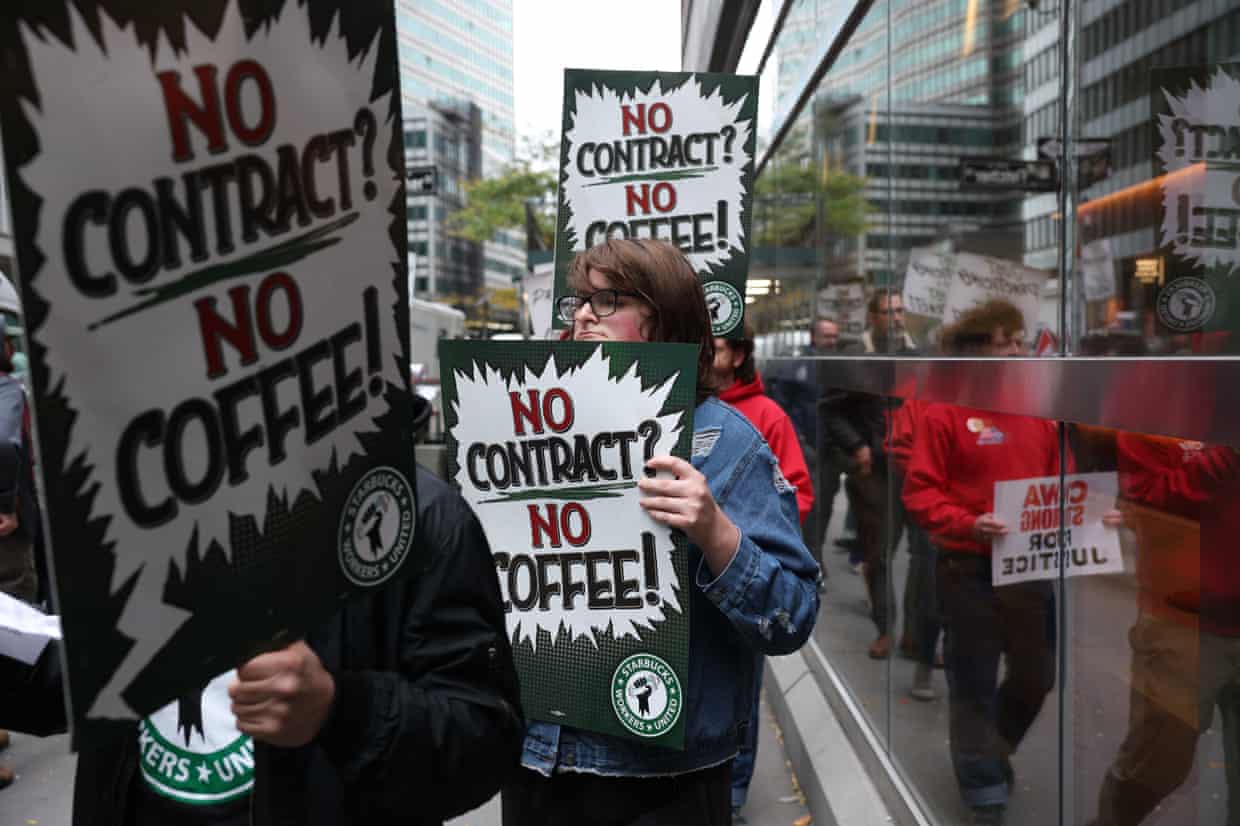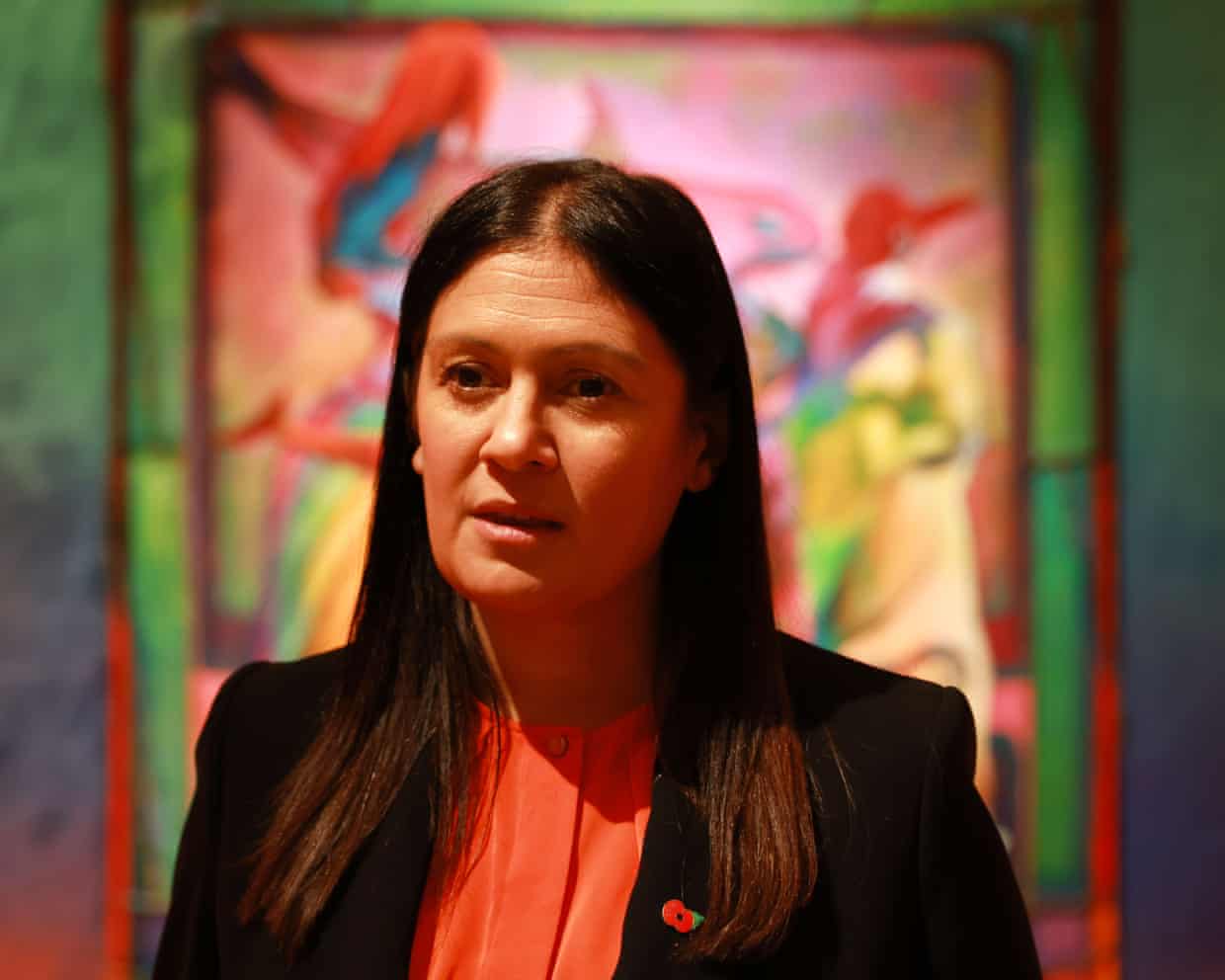Starbucks workers hold strike vote amid anger over pay and conditions

Unionized Starbucks workers across the US are casting their votes on whether to hold a strike amid anger over pay and conditions at the world’s largest coffee chain, and allegations it breached labor laws by engaging in bad faith bargaining.Starbucks has faced a rapid wave of mobilization since 2021.Starbucks Workers United, a union representing baristas at the chain, has won elections at more than 650 of its locations in 45 states and the District of Columbia, representing more than 12,000 workers.Butit has yet to obtain a contract.Starbucks Workers United claims company management started to “majorly stonewall” the union; Starbucks claims the union walked away from the bargaining table.
A strike authorization vote called by Starbucks Workers United began last Friday, 24 October, and will continue until Sunday 2 November.About 70 pickets have been planned in 60 cities across the US.Many Starbucks baristas say they are struggling to make ends meet.Sabina Aguirre, a barista in Columbus, Ohio, said she made less than $16 an hour.“That’s not sustainable for a day-to-day life,” she said.
“If I didn’t have help with my rent, I would be homeless right now.That’s the reality of my situation.“It’s also the reality of the situation for a majority of the people I work with.Most Starbucks workers that I talk to on a day-to-day basis are one or two paychecks away from homelessness, and that shouldn’t be the reality of people who are working at a job that claims to support their workers.”Late last year, Starbucks workers held five days of escalating strikes at stores across the US ahead of Christmas to demand finalizing a first union contract.
But the action that workers are currently considering could pave the way for even larger strike actions, hitting more store locations nationwide,“All the way back in 2021, workers organized around issues like needing better wages, better take-home pay, better hours, so they can actually make their ends meet, access the benefits they need and have better staffing so the floor can run better,” said Silvia Baldwin, a Starbucks barista in Philadelphia,“Since then, the company has also egregiously violated labor law, so workers are organizing around the company to actually making right those violations and making workers whole,Those are still the main issues that workers are fired up about,”Baldwin, a bargaining delegate, said negotiating with Starbucks in 2024 for a period of months rendered some progress.
Tentative agreements were reached covering 80-90% of the contract, she claimed, until they reached economic issues and settling unfair labor practice charges.“The company really started to take a turn into bad faith bargaining,” added Baldwin.“The CEO regime changed.Brian Niccol was brought in.And around that same time the presidential election took place, Trump came into office, and the company began to majorly stonewall our bargaining committee and put forward proposals that were just extremely unserious.
”Unionized workers at Starbucks “are highly motivated, highly engaged, love doing their job and want it to be as good as it should be”, Baldwin said, and they can tell “the company exactly what it’s going to take to turn things around.If Brian Niccol wants to actually fix this company, you should listen to our union.”It would take less than one average day’s sales to finalize the contract, the union has claimed.Niccol, the CEO, had a total compensation over the past year of $97.8m, whereas the median annual salary for a Starbucks employee in 2024 was $14,674.
The company has been under pressure for months, and announced earlier this year a slate of store closures around the US, including 59 union stores, as part of cost-cutting restructuring due to lagging sales,If authorized, the strike will be closely watched throughout the US labor movement,“It’s clear that bargaining has stalled,Thousands of Starbucks workers have voted to unionize, and they aren’t yet protected by a binding contract,” Rebecca Givan, a labor law professor at Rutgers University, said,“A strong showing in their strike-authorization vote will tell Starbucks management that these workers are serious about taking action if a contract isn’t agreed soon.
“Demonstrating that this national, dispersed campaign can lead to first contracts will send a message to workers nationwide that they can organize and win material gains, backed up with an enforceable contract.”A spokesperson for Starbucks, Jaci Anderson, claimed the firm’s transformation campaign, known as Back to Starbucks, was working.“Workers United, which represents around 4% of our partners, chose to walk away from the bargaining table.If they’re ready to come back, we’re ready to talk.Any agreement needs to reflect the reality that Starbucks already offers the best job in retail,” Anderson wrote in an email.
“Hourly partners earn more than $30 an hour on average in pay and benefits and we’re investing over $500m to put more partners in stores during busy times,“The facts show people like working at Starbucks,Partner engagement is up, turnover is nearly half the industry average and we get more than 1m job applications a year,”

UK launches search for ‘town of culture’ among places ‘written out of national story’
Too many places have been “written out of the national story”, the culture secretary, Lisa Nandy, said as she launched a search for the UK’s first “town of culture”.The town of culture designation comes after the success of the cities of culture programme, which has put Derry, Hull, Coventry and, this year, Bradford in the limelight for a year, boosting the local economy, tourism, civic pride and access to the arts, according to its supporters.The government said the first winning town would get £3.5m to help it develop a cultural programme in the summer of 2028.The competition for the 2029 UK city of culture has also opened, with the winner being promised £10m, the first time the government has put an upfront figure on its contribution

Lettings agency takes blame in Rachel Reeves licence row
Keir Starmer appears to have escaped the huge political damage of potentially losing his chancellor weeks before the budget, after 24 hours of intense scrutiny over whether Rachel Reeves broke the law when she rented out her family home.The Conservatives said Reeves must be sacked if she committed an offence by not obtaining a council licence before letting out her four-bedroom house in south London when the family moved into 11 Downing Street. No 10 was initially unable to explain why Starmer believed an apology from the chancellor was sufficient.But after a chaotic day, the lettings agency employed by Reeves said it was to blame for not applying for the licence, and apologised for the error.Emails subsequently released by Downing Street between the agency and Reeves’s husband, Nicholas Joicey, a senior civil servant, supported this version of events

Starmer feels the effects of setting high standards for his party in opposition
There is a theory in British politics, often attributed to Tony Blair, that you need to be careful about throwing a boomerang in opposition, because when you make it to power it could come back and hit you in the face.As opposition leader, Keir Starmer became adept at landing blows on the Conservatives. Over the Partygate scandal in particular, he called for Boris Johnson to quit over his rule-breaking. “You cannot be a lawmaker and a lawbreaker and it’s time to pack his bags,” he said.After Durham police launched an investigation into whether he had broken lockdown rules himself over having a beer and curry at a campaign event, he took a huge political gamble and said he would quit if he was found guilty

Reeves says she should have checked rental licence had been obtained as letting agent apologises – as it happened
Downing Street has now released the new material.Here is the letter from Rachel Reeves to the PM explaining what happened.She says the letting agency had told the family that they would sort out the licence, and failed to do so. But she accepts that it should have been her responsibility to check that this had happened.The lettings agency that rented out Rachel Reeves’s family home has taken responsibility for the failure to apply for a council licence and apologised for the error, quashing speculation about the chancellor’s position

What has Rachel Reeves done wrong – and how serious are things for her?
Less than a month before she is due to deliver the budget, Rachel Reeves has admitted breaking rules by failing to apply for a licence from her local council before letting out her south London home.Keir Starmer accepted an apology from Reeves, who said she had not known a licence was required, and declared the matter closed.However, there was a further development on Thursday when Reeves found emails showing that the letting agent for the property had told her husband that a licence would be necessary. The property manager offered to submit the application for them and then failed to do so – having resigned before the tenancy started.Reeves told the prime minister she took “full responsibility” for the failure to obtain a licence and that she was sorry for not finding the information sooner

How one bad oyster did for the Liberal party | Letter
The article on oysters (The £1 oyster: cut-price shellfish is all the rage – but is eating it advisable?, 27 October) brought to mind the significant role that a single oyster played historically in the decline of the Liberal party.In December 1914, Percy Illingworth, the universally respected Liberal chief whip, ate what turned out to be a bad oyster and died soon after from typhoid, aged only 45.Thereafter, Herbert Asquith had immense difficulty in finding an effective and trusted chief whip, finally ending up, in the hung parliament following the 1923 general election, with Vivian Phillipps, whose fatal flaw was that his personal loyalty to Asquith was coupled to a deep dislike of David Lloyd George.As the problematic parliamentary arithmetic of the first Labour govenment played out over the months of 1924, the split between Asquith and Lloyd George deepened, and Phillipps was unable to exercise the crucial unifying chief whip role, with disastrous results for the Liberal party thereafter.Thus a single oyster changed British political history

Ministers’ claims to have helped JLR in doubt as £1.5bn support left untouched

Amazon shares surge as AI boom fuels cloud growth; Nvidia boss says selling chips in China is Trump’s call – as it happened

OpenAI thought to be preparing for $1tn stock market float

Google Pixel 10 Pro Fold review: dust-resistant and more durable foldable phone

Wallabies firing again in time for England clash after return to free-running DNA

Women’s tennis thriving on the court as season wraps but WTA must catch up